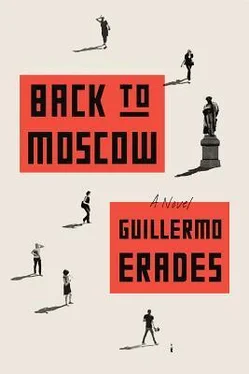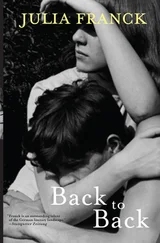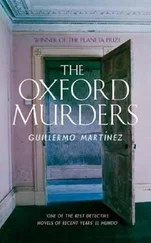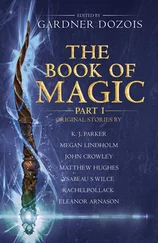I think often about that cab we never took, the ride home that was not meant to be. That’s the thing with real life. Unlike literary characters, our future is mostly shaped by small, trivial choices — seemingly insignificant, but deceptively fateful.
‘I SWEAR TO GOD, WE desire death more than you want life.’
The handsome bearded man was sitting on the floor, his legs crossed, wearing a black winter jacket and a black beanie. He stared into the camera. ‘We’ve come to Russia’s capital to stop the war, or to die in the name of God.’ His voice was serene. His dark complexion and Caucasian accent called to mind a Moscow taxi driver. The TV titles said he was the leader.
By now, the siege had been ongoing for almost a full day. The live broadcast from outside the theatre, which had begun around midnight, had been showing military trucks arriving at the scene and Russian soldiers sealing off the perimeter. It was a grey October day and you could see the frozen rain dashing across the screen, falling on the police vans and the ambulances.
The entire world was now following the stream of news from Moscow. It was known that the night before, a group of armed Chechen militants had stormed the Dubrovkatheatre, interrupting the performance of Nord Ost , a popular musical. About nine hundred people, staff, cast and audience, were being held hostage. Mixed into the live coverage, footage relating to previous tragedies flashed up on the screen — the hospital hostages in Budyonnovsk, the bombed buildings in Pechatniki, the explosion in Pushkinskaya.
Then a new clip: this time the bearded man was clad in military fatigues. He sat on a stool inside the theatre, surrounded by armed men and women with their faces covered. ‘Either the president orders the immediate retreat of Russian troops from Chechnya,’ he said, ‘or the theatre will be blown up with all the hostages inside.’
I often wonder what would have been my first reaction to the news had I seen it live on TV, from my couch. Surely I would have been disturbed by the scale of the drama, by the thought of the impending tragedy. Sooner or later, though, I would no doubt have switched channels, turned off the TV, put my mind elsewhere.
But these images I only saw later, after everything was over. While the bearded man appeared on screen for the first time, Tatyana and I were inside the theatre, sitting in the stalls, eleventh row, guarded by a group of women in black hijabs wearing belts of explosives strapped to their bodies.
I have a blurred recollection of those first hours. When I look back, I see a succession of images that never follow the same order, as if they were stored in different and remote corners of my mind and could only be gathered with great effort. Besides, the memories of those eternal hours have melted into the nightmares of the nights that followed. The masked men wore military fatigues, but I never saw their faces — not in my memories, not on the screen. Never in my dreams.
I do recall the moment when the armed men first walked onto the stage, shouting, shoving the actors around. Perhaps I remember this with clarity because for a few seconds I thought it was all part of the show — and so, those seconds ended up being the last before my world shifted. Then I saw the terror on the faces of the child actors who had just been singing onstage and were now being herded towards the stalls.
Tatyana kept grabbing her belly. She was breathing rapidly. I held her hand and whispered into her ear. For a short while, she seemed to calm down. But halfway through the first night, something snapped inside her and she began to mutter hysterically, about missing work, how she had an appointment in the morning to show an apartment in the centre. ‘I hope we get out before eight,’ she said, her eyes staring straight past me into the red velvet seats.
The women in hijabs were ranged along the side aisles, facing the audience, holding their pistols up. Most hostages were calm, as though ready to endure whatever came their way. The orchestra pit was used as a toilet. People took turns, and a silent queue formed along the first row. Two rows in front of us, an old man spent hours clutching an immense bouquet of flowers, as if expecting the show to resume so that he could hand it to one of the actors during the final curtain call. The scene reminded me of the times when the metro stops abruptly for no reason and passengers, trapped underground, remain serious and composed, waiting for movement to resume; except that, inside the besieged theatre, everybody looked ridiculous and out of place, especially the older women in their formal dresses and complicated hairdos — their best perfume mixing with the stench of shit and piss that wafted from the orchestra pit.
Then came the long hours in which I was neither asleep nor awake. My mind was caught in a feverish state of expectation, drifting in and out of uneasy dreams — every little sound triggered a violent reaction in my head, bringing me back to the reality of the theatre. At some point I heard a muffled shot coming from the direction of the lobby. It’s starting now, someone mumbled, but then everything went quiet again. Tatyana slept for hours, or at least lay down in silence, her head on my lap.
It’s only when you meet the possibility of your own death that you fully comprehend the banality of the mental processes that kept you going for so long. Suddenly, I could no longer see the horizon and, as a hungry hole of nothingness swelled ahead of me, I couldn’t help but think about the fragility of our existence. In the face of extinction, simply being alive became, in itself, meaningful.
You were wrong: I wanted life more than you desired death.
Then, on Friday night, after two days of angst and exhaustion, I woke up gasping for air — my heart racing, the red velvet seats spinning endlessly. My eyelids felt heavy. For a split second I saw Tatyana stretched on the floor, among the rows of seats, her head turned away. Before I could reach out my hand to touch her, an irresistible force sucked at my consciousness and dragged me back down into a pool of blackness.
When I woke again I was a different person. Paralysed by a blinding headache, I squinted around, disoriented, searching for Tatyana. It took me a few moments to realise that I was no longer in the theatre. Two men in white gowns were standing nearby, their eyes fixed on a small TV that hung on the wall. A hospital room, I realised, and, before I was able to speak, I was told we were celebrating. The news coverage had just announced that all nine hundred hostages had been freed, unharmed. All the terrorists had been killed. In preparation for their assault, the Russian special forces had pumped a powerful sleeping gas into the theatre, knocking everybody out. A seamless operation, we were told. Now, on the TV screen in my hospital room, I saw family members celebrating outside the Dubrovka theatre, as messages flew in from around the world to congratulate the Russian leadership on their success. The grainy images on the screen showed the armed men and the women in black hijabs scattered among the theatre seats and on the carpeted floors. Their eyes and mouths were wide open, their foreheads adorned with perfect bullet holes.
SADNESS. MELANCHOLY. LONGING. Depression. The Russian word toska is rich in meaning. In his annotated translation of Evgeny Onegin , Nabokov warns us that ‘no single English word renders all the shades of toska’.
‘At its deepest and most painful,’ Vladimir Vladimirovich writes, ‘it is a sensation of great spiritual anguish, often without any specific cause. At less morbid levels it is a dull ache of the soul, a longing with nothing to long for, a sick pining, a vague restlessness, mental throes, yearning. ’
Читать дальше












